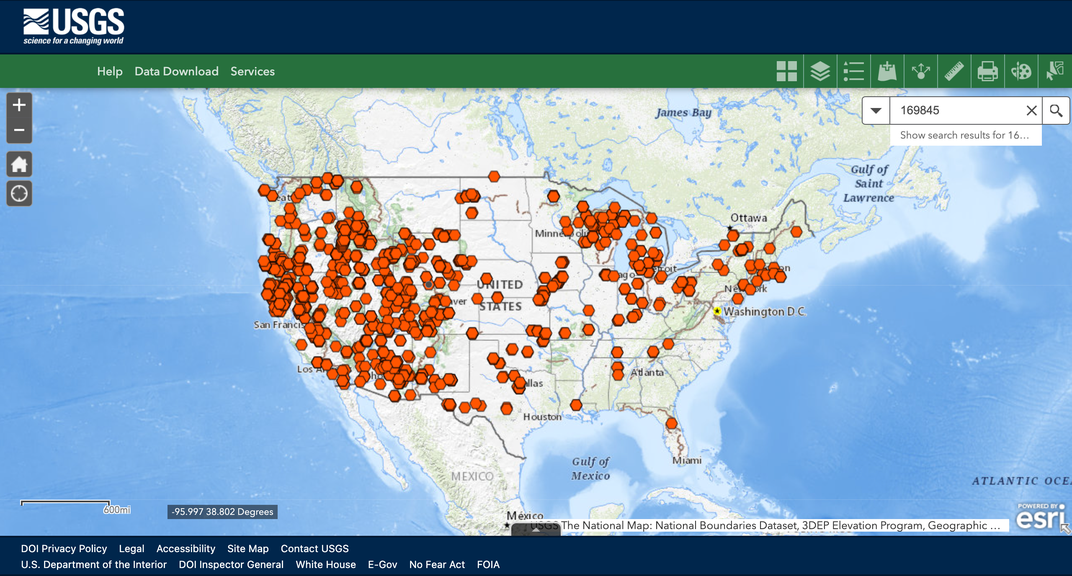How did it take them so long to get to this?
Are they saving these things – like a rolling release of steamrolling American history?
The United States Department of the Interior (DOI) proposed a list of new names for more than 660 geographic features across the country last month, the agency announced in a statement.
Led by the U.S. Secretary of the Interior Deb Haaland, the first Native American to serve as cabinet secretary, the February 2022 release of the list marks the next step in a sweeping plan to remove the racist and misogynist slur “squaw” from the national geographic landscape. Hundreds of U.S. geographic sites, including mountains, rivers, lakes, remote islands and more, currently are named using the word, report Neil Vigdor and Christine Hauser for the New York Times.
“Words matter, particularly in our work to make our nation’s public lands and waters accessible and welcoming to people of all backgrounds,” said Haaland, per the statement.
“Consideration of these replacements is a big step forward in our efforts to remove derogatory terms whose expiration dates are long overdue,” added the secretary, who is a member of the Pueblo of the Laguna and a 35th-generation New Mexican.
Haaland first announced a secretarial order to remove the offensive phrase from federal lands in November 2021. She created a 13-member Derogatory Geographic Names Task Force, composed of members from the National Park Service, the Bureau of Indian Affairs and several other government agencies, which she then tasked with surveying federal sites and generating new name alternatives, as Melissa Montalvo reports for the Fresno Bee.
At the time, the secretary also officially declared “squaw” a derogatory term and directed the task force to replace the word with “sq_ _ _” in all official communications, as Rina Torchinsky reports for NPR.
Now, task force members are soliciting feedback on proposed name changes from Native American tribes and members of the public throughout the country. Those who wish to see the proposed name changes can view the full list online and submit feedback or mail comments through April 25. The task force will submit chosen names for final approval from the Board on Geographic Names, the federal body that standardizes American place names, per the New York Times.
At least five candidate replacement names ere chosen for each geographic site. Names were picked based on nearby features—for instance, if “Castle Creek” was the closest named feature to a place called “Squaw Mesa,” the first proposed name might be “Castle Mesa,” reports the Fresno Bee.
Some states, including Maine and Oregon, have already banned the word from place names, as Susan Montoya Bryan reported for the Associated Press last fall. And this month, lawmakers in California proposed their own state legislation that would replace all uses of the word in place names and geographic features, with a deadline of January 1, 2024, as Lila Seidman reports for the Los Angeles Times.
James C. Ramos, the first and only Indigenous member of the state Legislature, told the newspaper that the phrase, which is sometimes called the “S-word,” should be retired.
“There should be no reason why there shouldn’t be support to change the S-word, that is so degrading to Native American women, in the year 2022,” Ramos told the Los Angeles Times.
Also speaking with the Los Angeles Times, ACLU advocate Tedde Simon noted that slurs such as these both “perpetuate and allow for violence” against Indigenous women, which is an ongoing crisis in the U.S. Eighty-four percent of Indigenous women experience some form of violence during their lifetimes, as Brandi Morin reported for National Geographic this week.
Yeah, I’m sure all the Injun men beating and killing their wives are doing it because some mountain somewhere has “squaw” in it.
Last December, the U.S. Board on Geographic Names (BGN) approved a move to change the name of change Sq_ _ _ Mountain, a peak in Clear Creek County, Colorado, to Mestaa’ėhehe Mountain. The word means “owl woman” in Cheyenne, and is the name of a famous 19th-century Cheyenne female leader. The name change was brought about by the Mestaa’ėhehe Coalition, a group of local tribal leaders, as Clarissa Guy reported for Rocky Mountain PBS.
Now, the Mestaa’ėhehe Coalition is pushing for another high-profle change: to retire the name of Mount Evans, one of the Rocky Mountain’s best-known peaks, ascending more that 14,000 feet above sea level—one of the more than 50 that are known as “14ers.” Its namesake is the former territorial governor of Colorado, John Evans, whose proclamation on August 11, 1864, led directly to the brutal Sand Creek Massacre. Volunteer cavalrymen killed an estimated 230 innocent Cheyenne and Arapaho people, including women, children and elders.
Yeah, okay.
Now you’ve finally made me feel really bad.
To try to relieve the guilt, I’m going to get a George Floyd tattoo and have sex with a tranny refugee.
Doesn’t really roll off the tongue, does it?
 Daily Stormer The Most Censored Publication in History
Daily Stormer The Most Censored Publication in History



